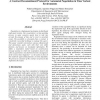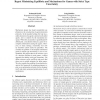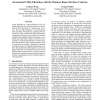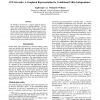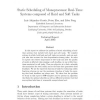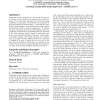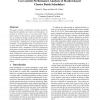133
click to vote
WOA
2001
15 years 3 months ago
2001
Negotiation is a fundamental mechanism in distributed multi-agent systems. Since negotiation is a time-spending process, in many scenarios agents have to take into account the pas...
113
click to vote
UAI
2004
15 years 3 months ago
2004
Mechanism design has found considerable application to the construction of agent-interaction protocols. In the standard setting, the type (e.g., utility function) of an agent is n...
116
click to vote
IJCAI
2003
15 years 3 months ago
2003
Utility elicitation is a critical function of any automated decision aid, allowing decisions to be tailored to the preferences of a specific user. However, the size and complexit...
105
Voted
AAAI
2006
15 years 3 months ago
2006
We introduce CUI networks, a compact graphical representation of utility functions over multiple attributes. CUI networks model multiattribute utility functions using the well stu...
AGI
2008
15 years 3 months ago
2008
One might imagine that AI systems with harmless goals will be harmless. This paper instead shows that intelligent systems will need to be carefully designed to prevent them from be...
133
click to vote
DELTA
2004
IEEE
15 years 6 months ago
2004
IEEE
In this report we address the problem of static scheduling of realtime systems that include both hard and soft tasks. We consider systems in which both hard and soft tasks are per...
ATAL
2006
Springer
15 years 6 months ago
2006
Springer
Multiagent resource allocation is a timely and exciting area of research at the interface of Computer Science and Economics. One of the main challenges in this area is the high co...
114
Voted
SIGECOM
2010
ACM
15 years 7 months ago
2010
ACM
We analyze the complexity of computing pure strategy Nash equilibria (PSNE) in symmetric games with a fixed number of actions. We restrict ourselves to “compact” representati...
139
click to vote
ICRA
2002
IEEE
15 years 7 months ago
2002
IEEE
— This paper describes decentralized control laws for the coordination of multiple vehicles performing spatially distributed tasks. The control laws are based on a gradient desce...
108
click to vote
CCGRID
2002
IEEE
15 years 7 months ago
2002
IEEE
This paper presents a performance analysis of marketbased batch schedulers for clusters of workstations. In contrast to previous work, we use user-centric performance metrics as t...
